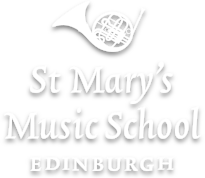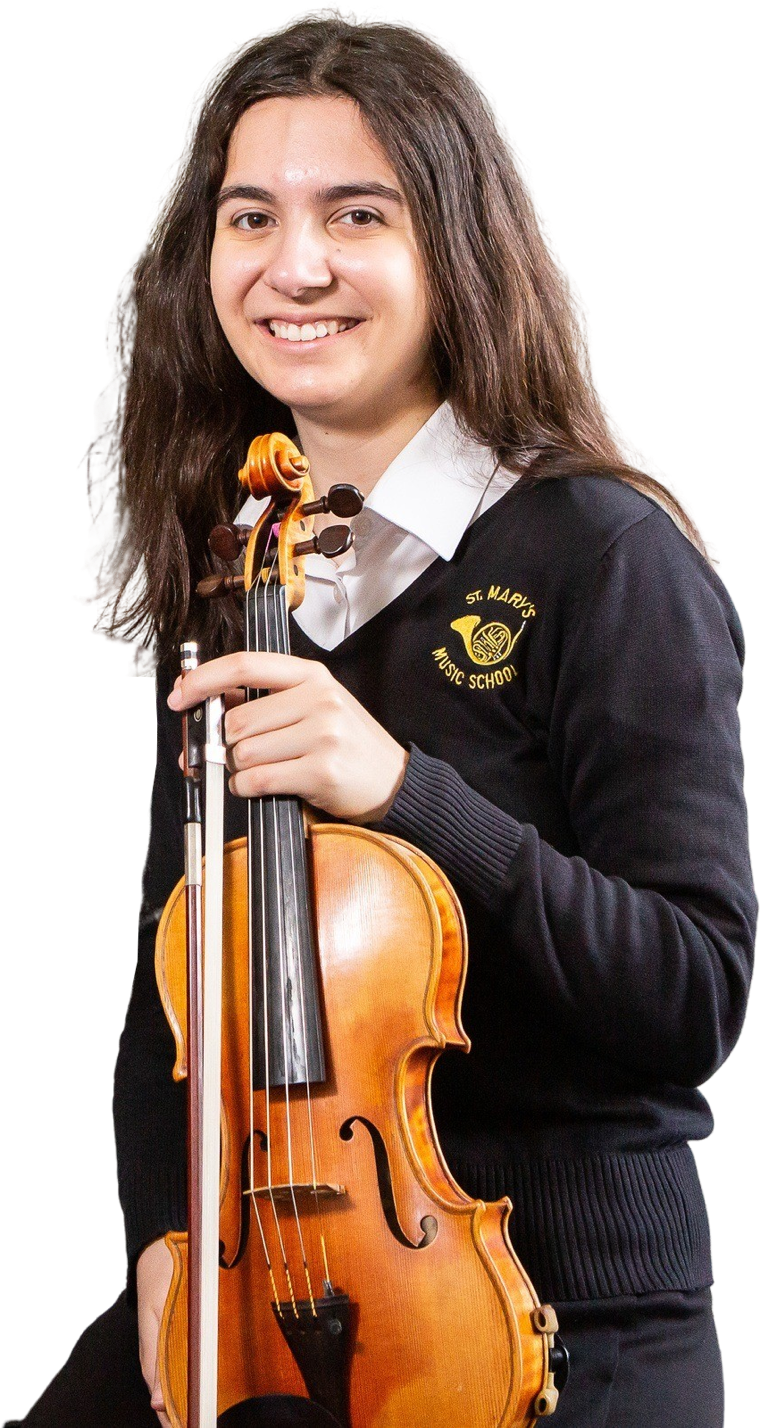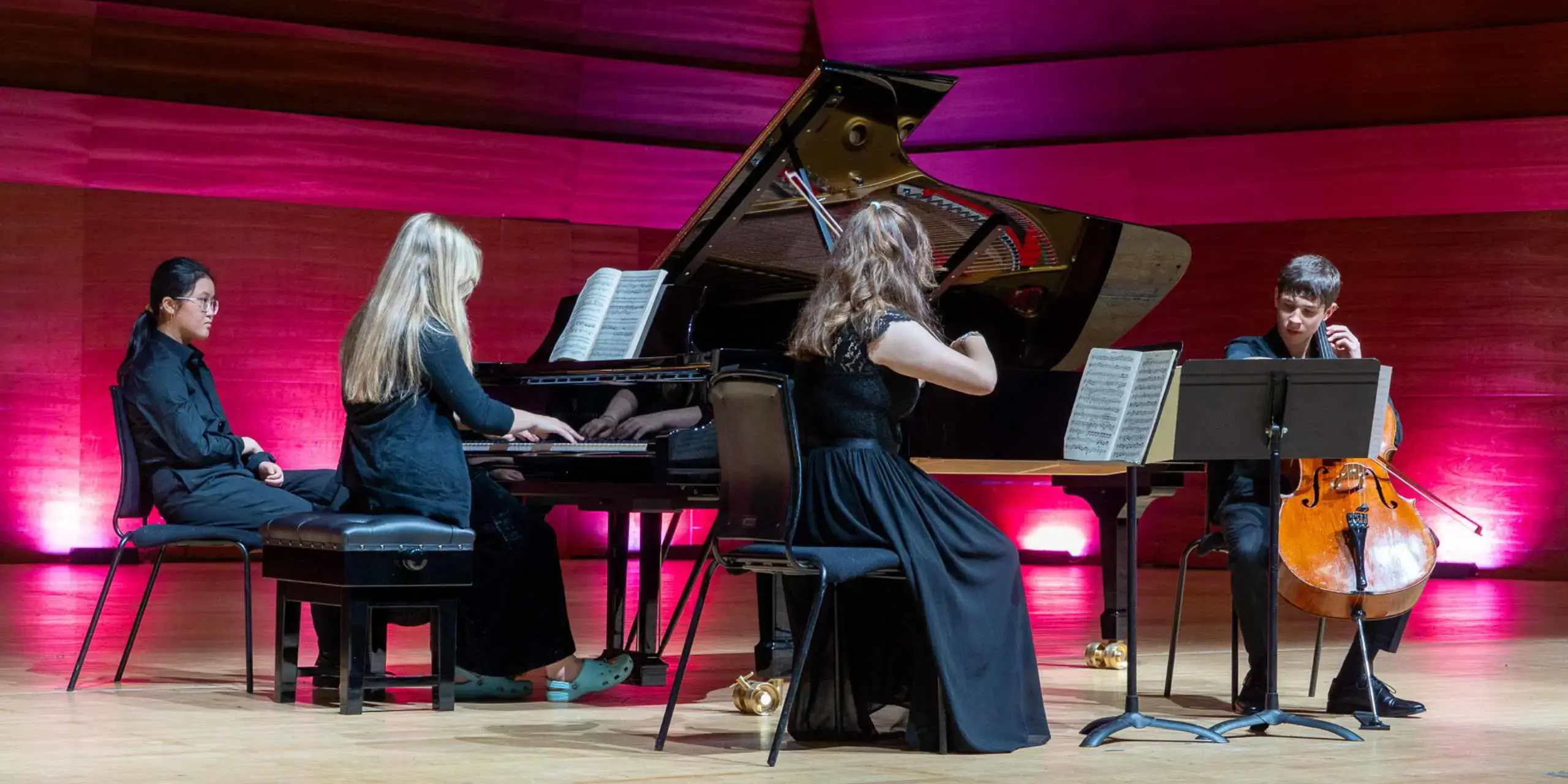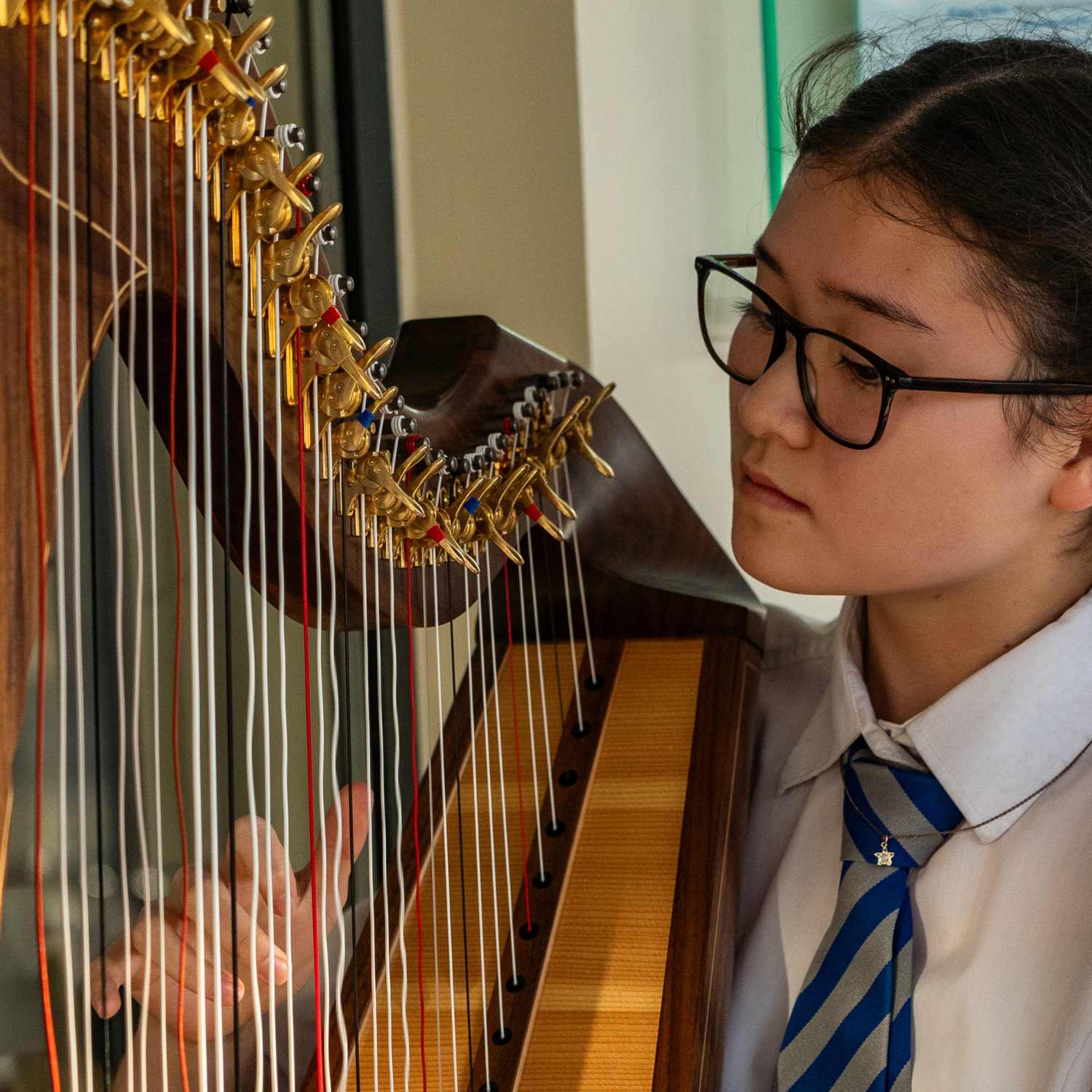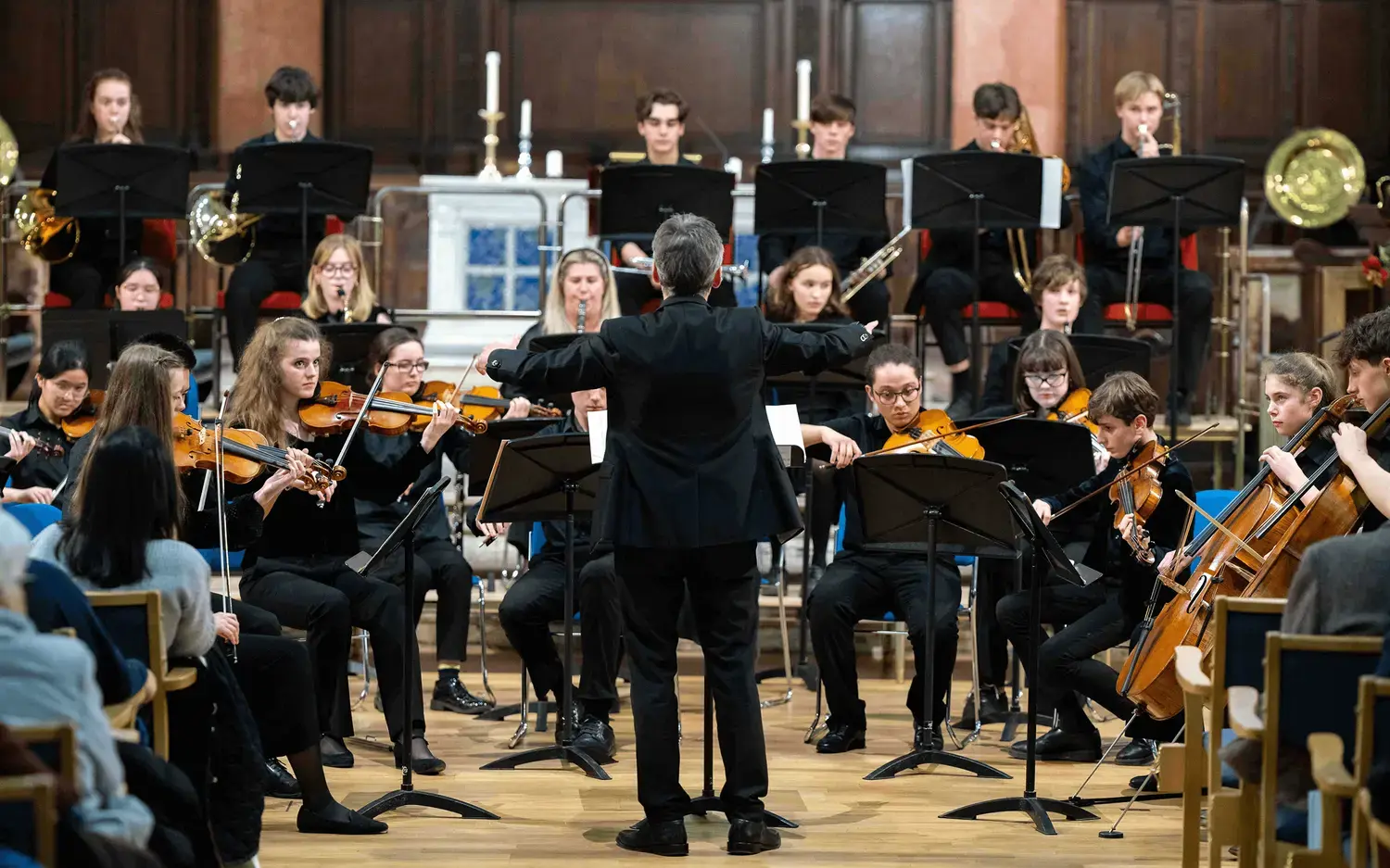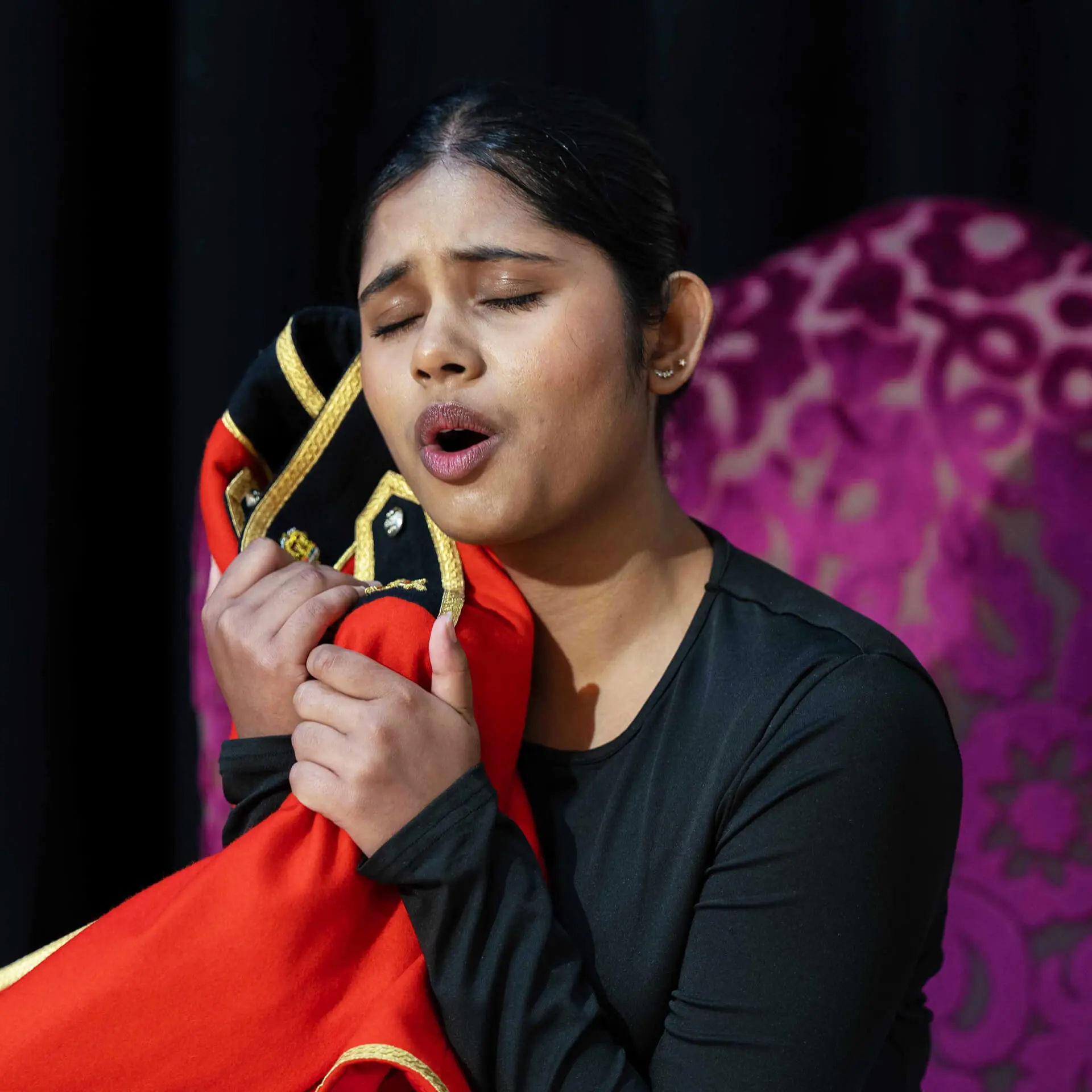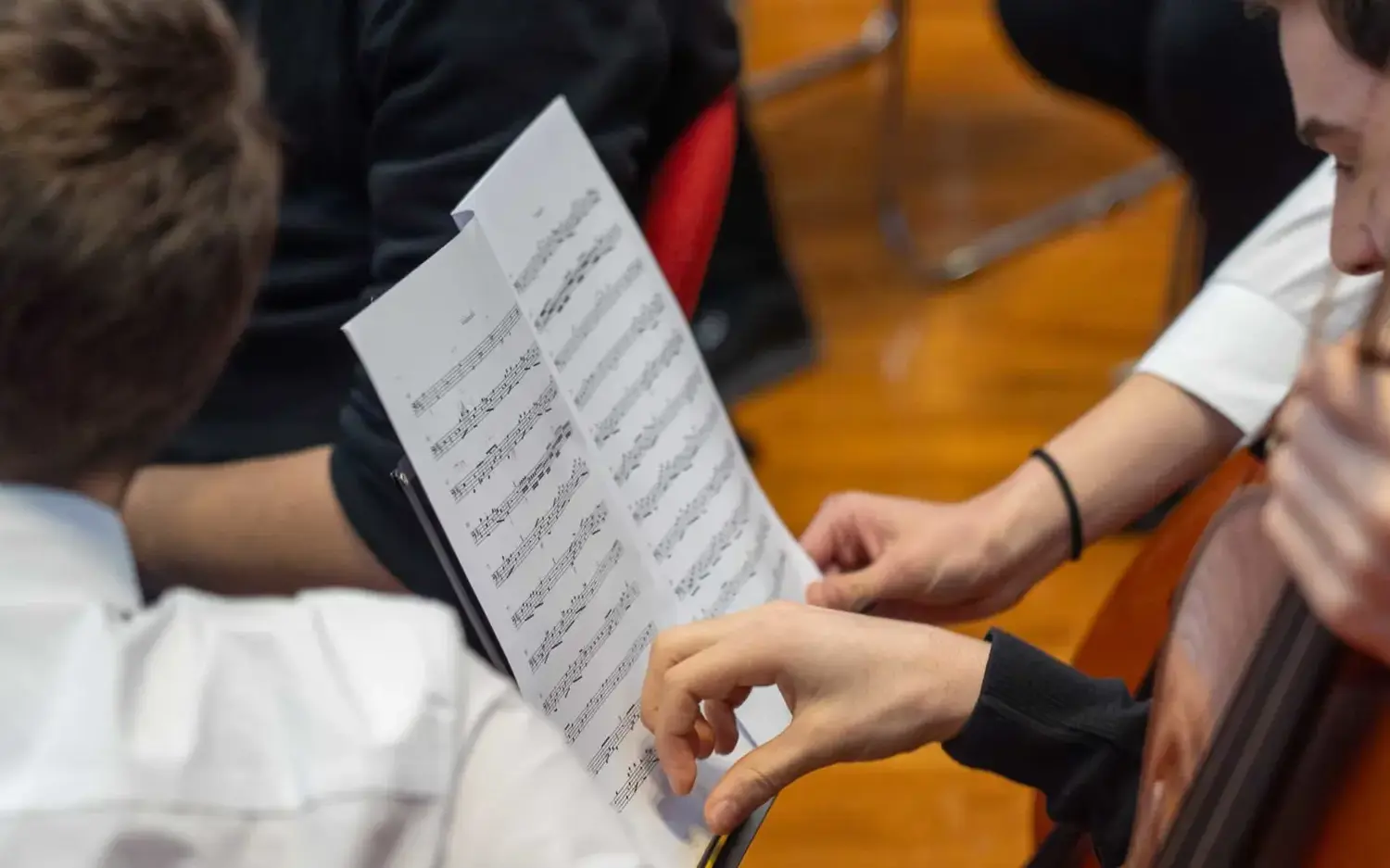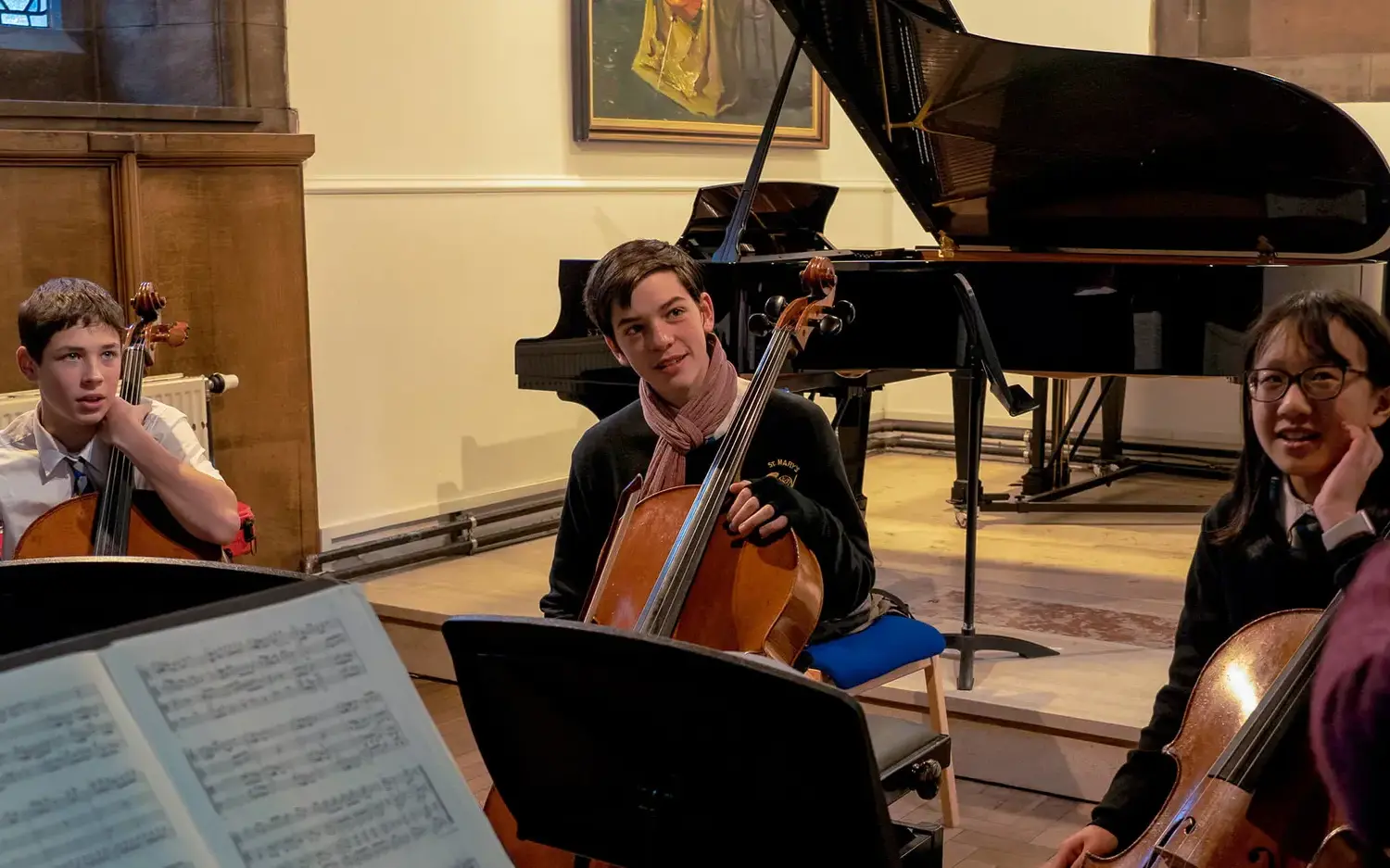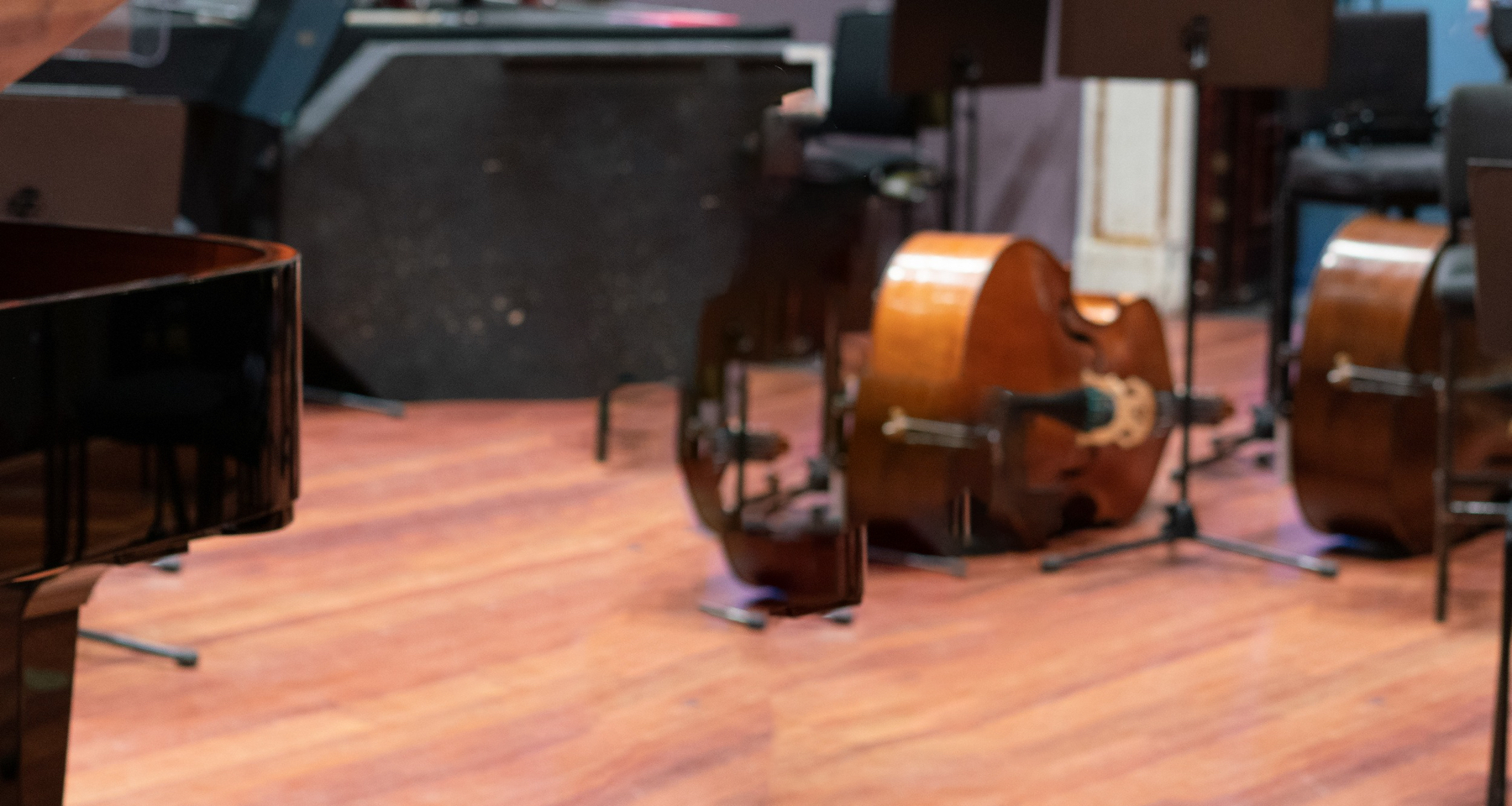ENSEMBLES AND GROUPS
Exploring harmony in perfectly synchronised motion
We encourage our pupils to embark on a joyful journey of collaborative musical expression through the various choirs, orchestras and ensembles on offer at St Mary's Music School.
In each and every setting, our pupils discover the joy of working together to create musical harmony and express their shared love for music. Every pupil sings in our School Choir and, in addition to our larger ensembles – the Junior Orchestra, Senior Orchestra, Senior String Ensemble and Brass Ensemble - we offer a host of opportunities to be part of smaller groups and to explore different genres such as the Music Plus Ensemble and Early Music Group. Chamber Music is one of the greatest ways for young musicians to develop an appreciation of playing and interacting as part of a small musical group, and forms a core part of our curriculum, with all pupils playing in our various Junior Chamber Music Ensembles and Senior Chamber Music Ensembles.
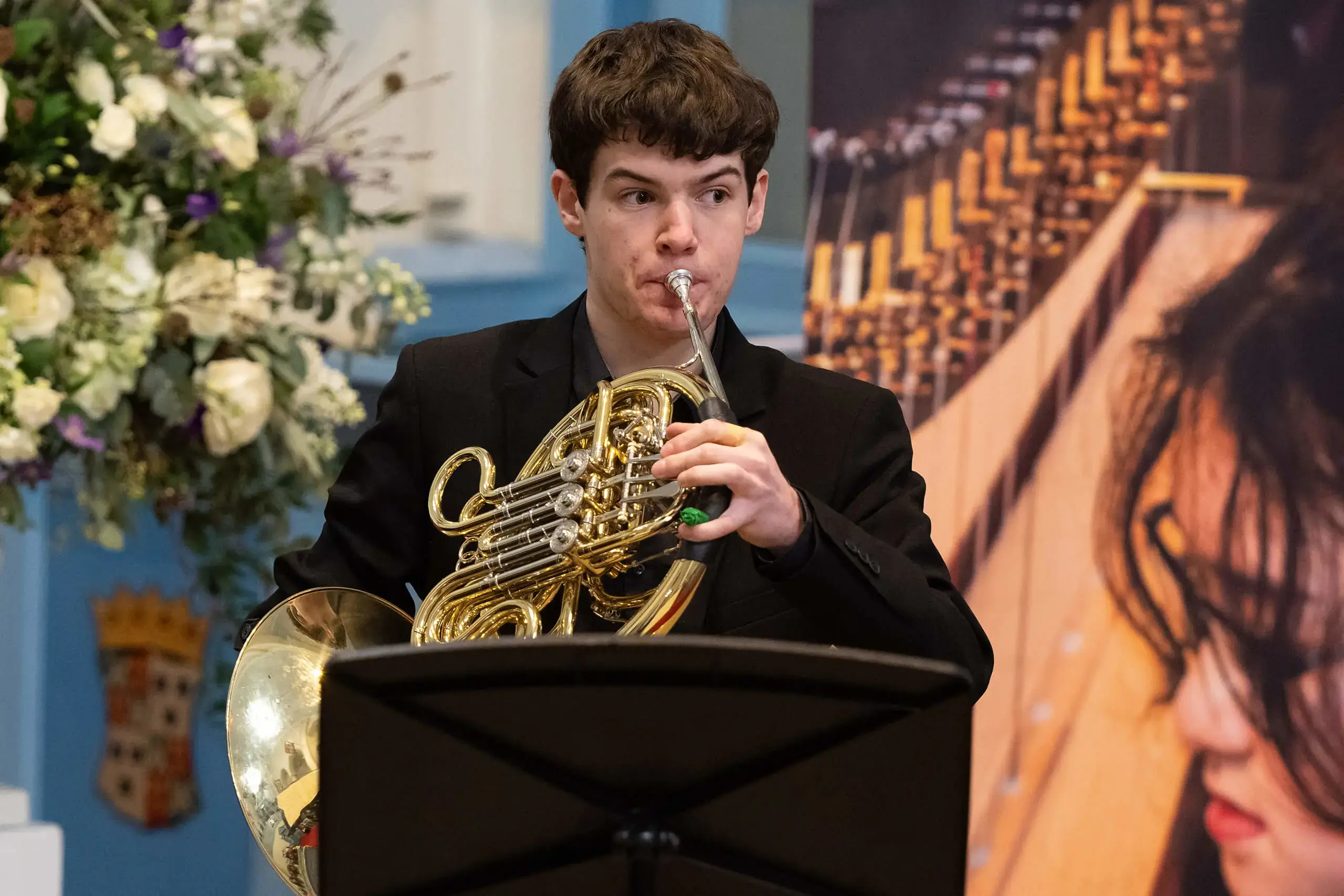
It's not all Mozart and Beethoven!
We embrace traditional and folk music too, inspire self-directed musical thinking through our Improvisation Club and celebrate this through monthly Jazz Days, all of which help to foster creativity and musical exploration across multiple genres.
Playing away from schoolPupils regularly play and perform with the established network of fantastic youth orchestras in Scotland during their time here, and many are members of the Edinburgh Youth Orchestra, National Children’s Orchestra, National Youth Orchestras of Scotland, National Youth Orchestra of Great Britain, National Youth Jazz Orchestra of Scotland and Tommy Smith Youth Jazz Orchestra. Young singers participate in the Scottish Opera Young Company programme and many join the National Youth Choirs of Scotland. |
|
Explore our ensembles and groups
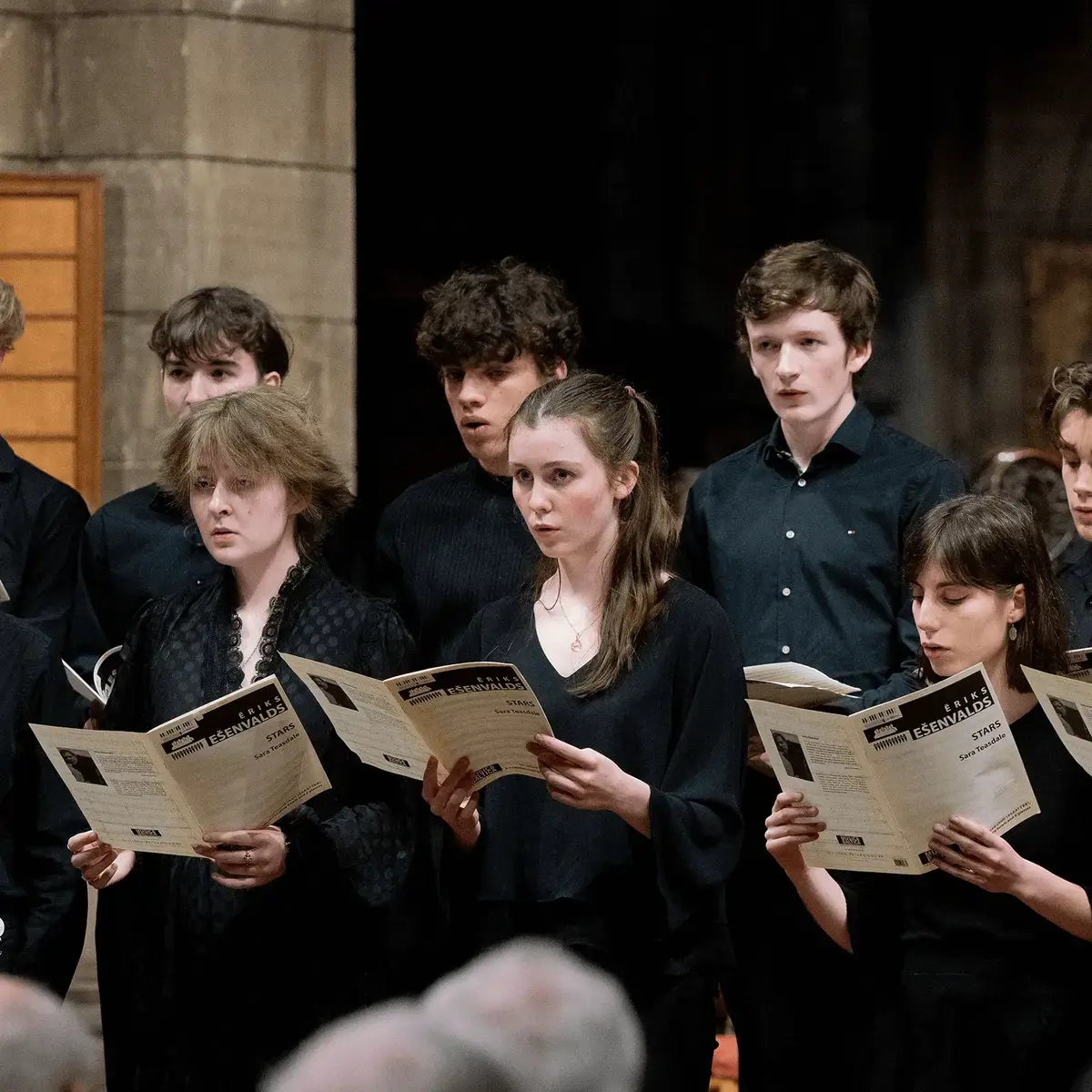
School Choir
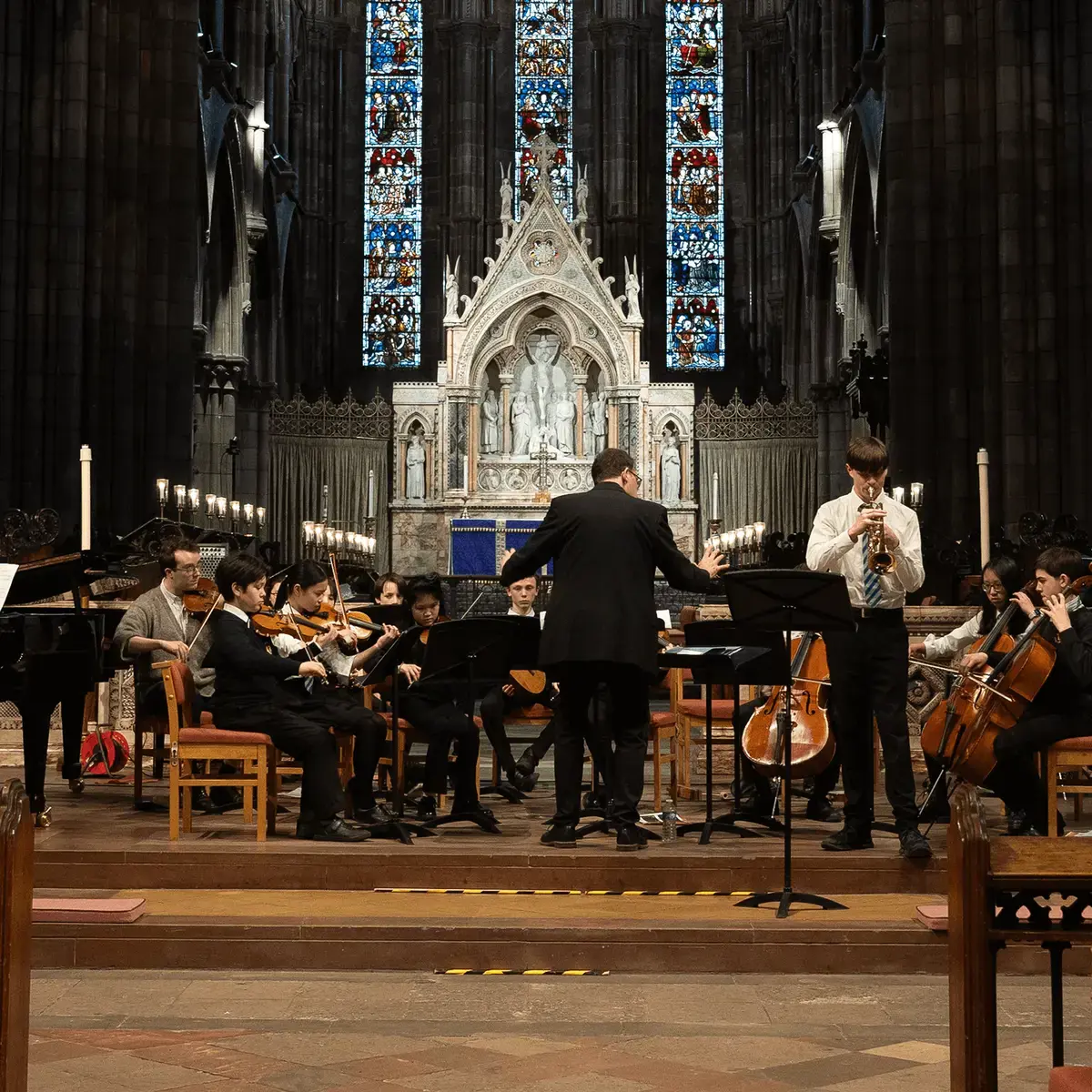
Performance Plus
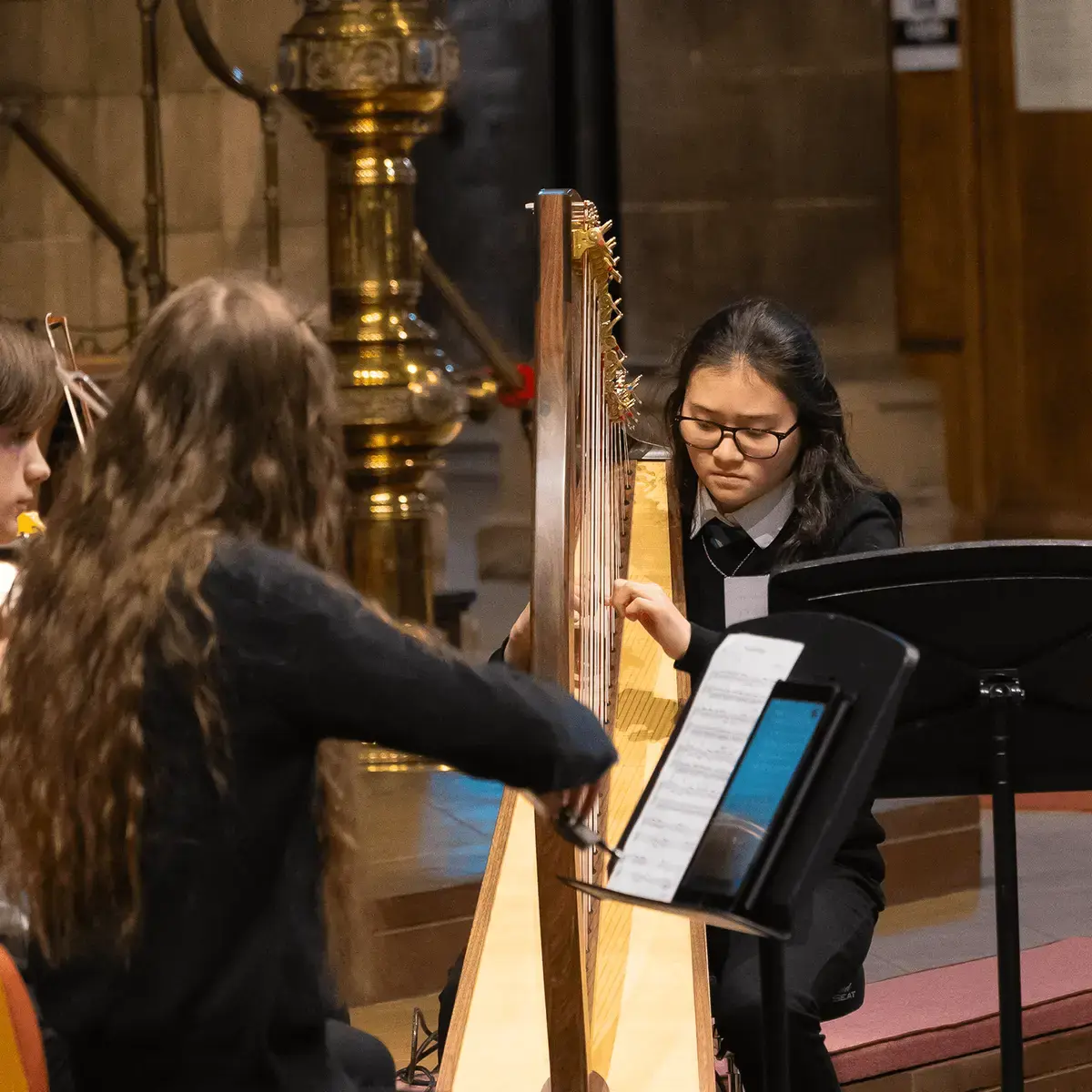
Early Music Group
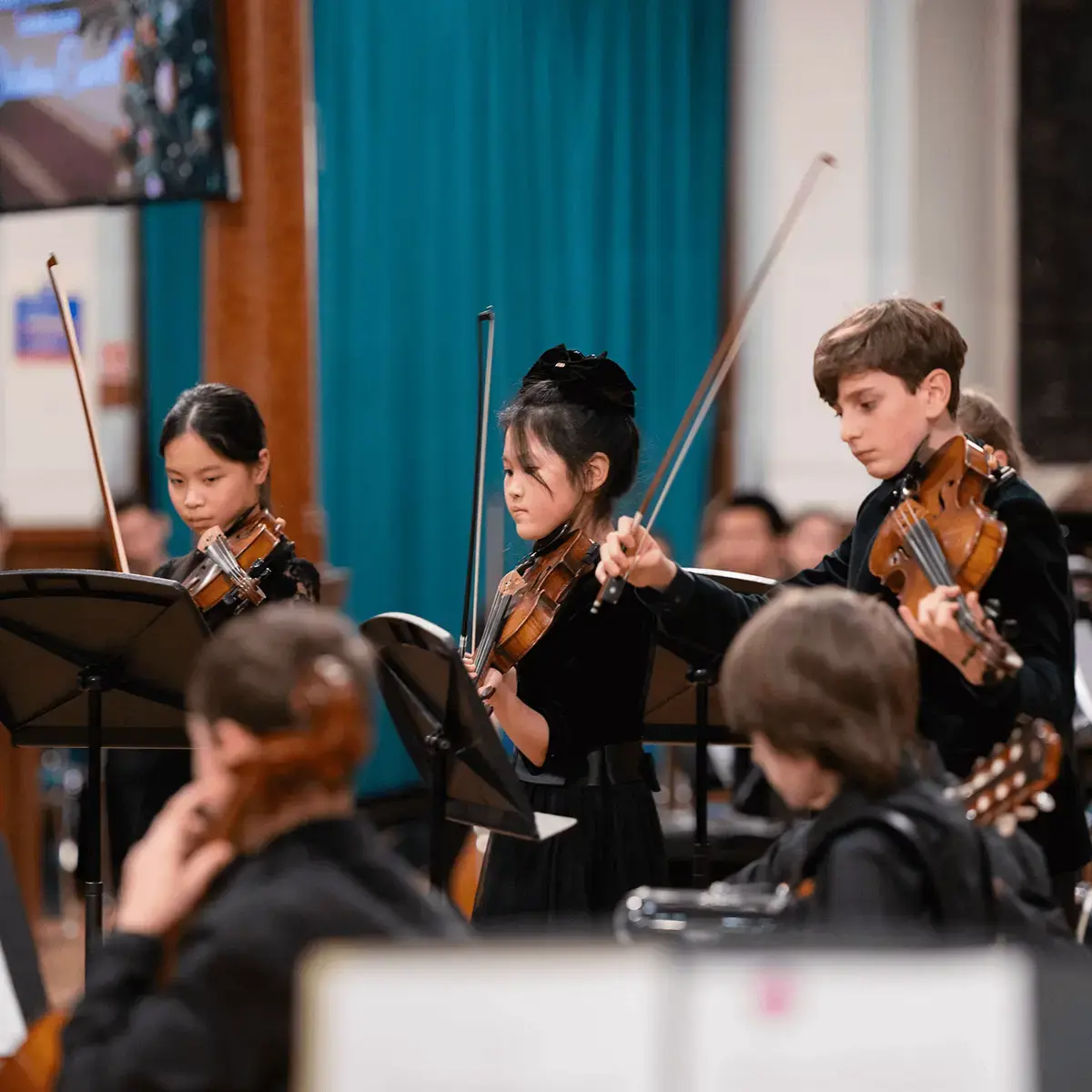
Junior Orchestra
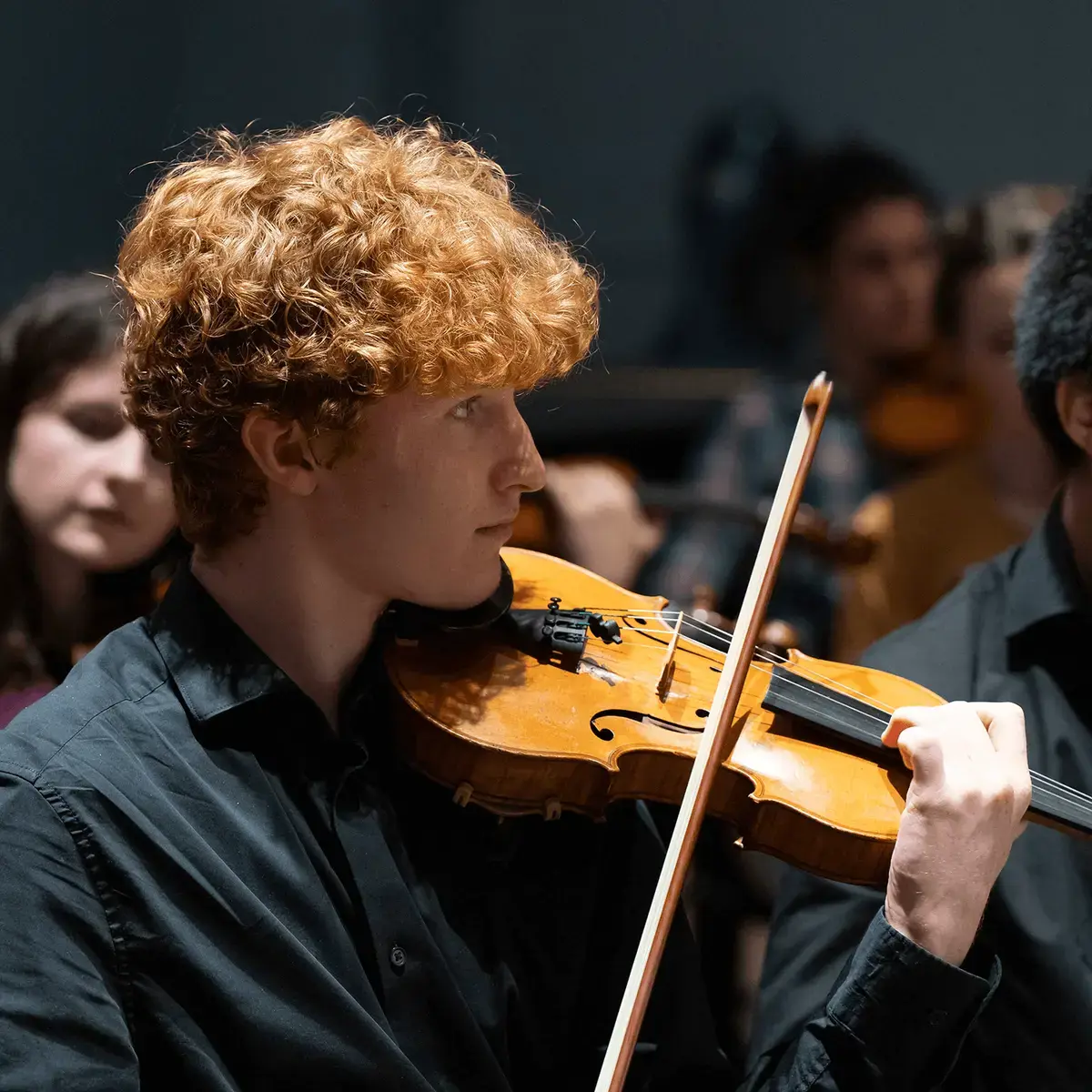
Senior Orchestra
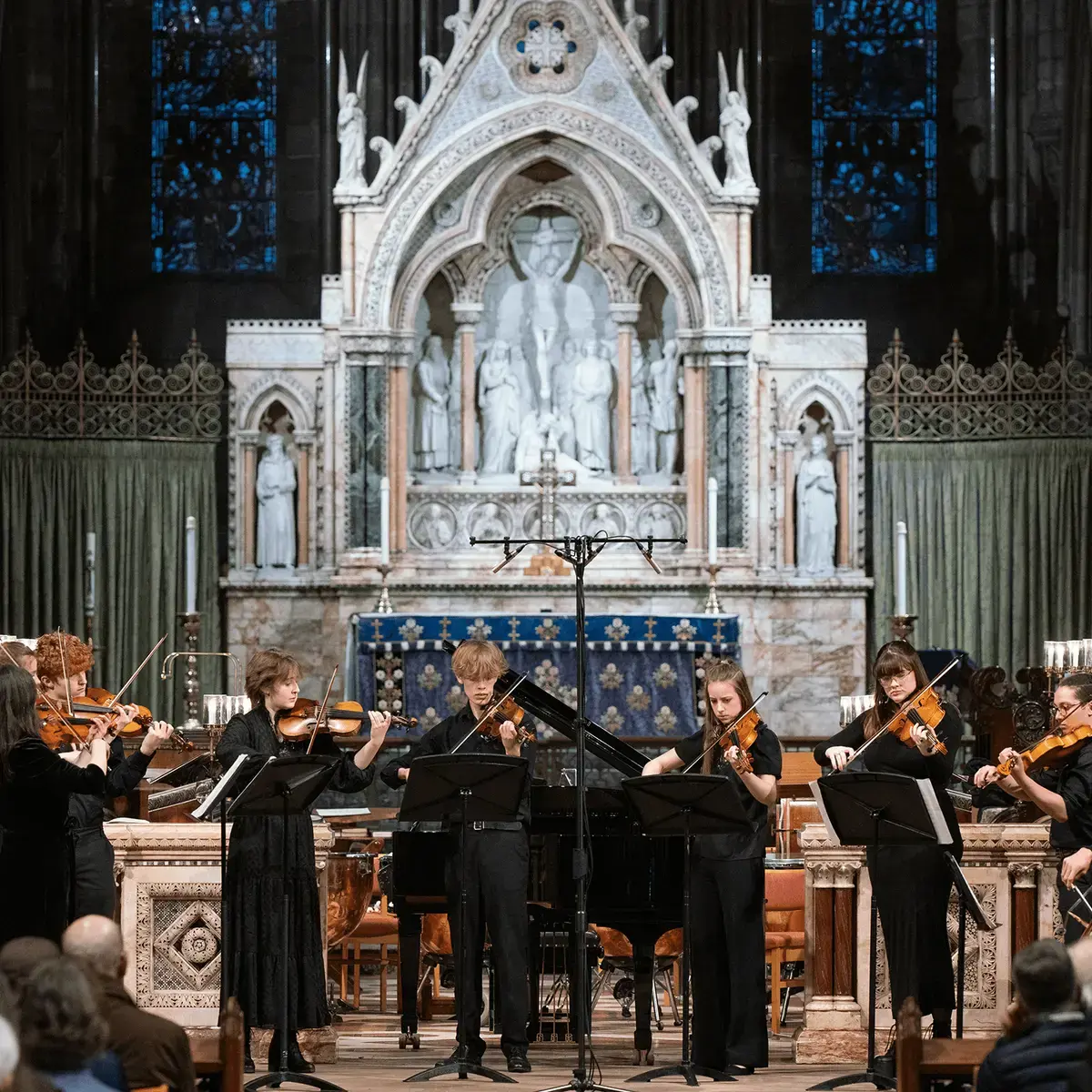
Senior String Ensemble

Brass Ensembles
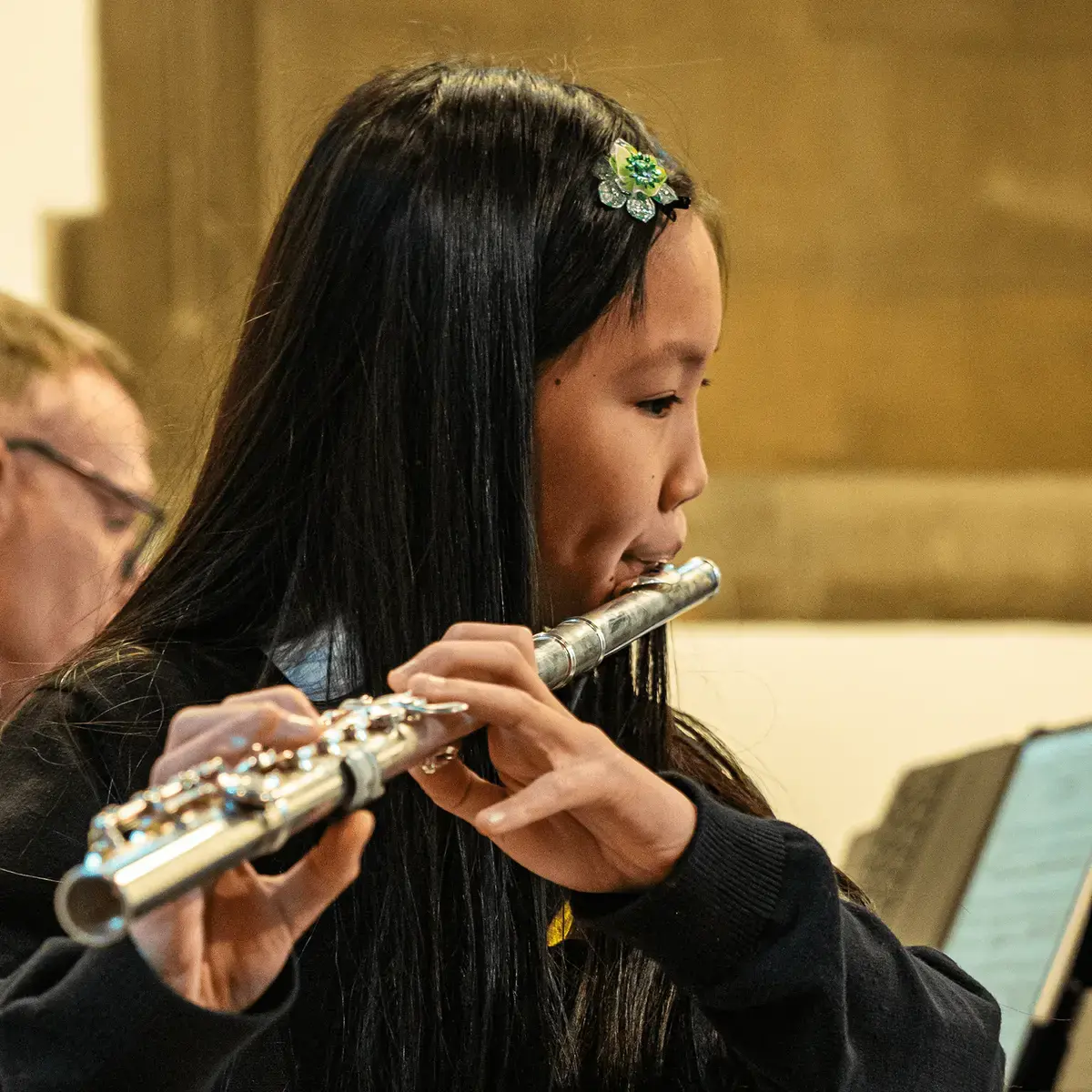
Woodwind Ensemble
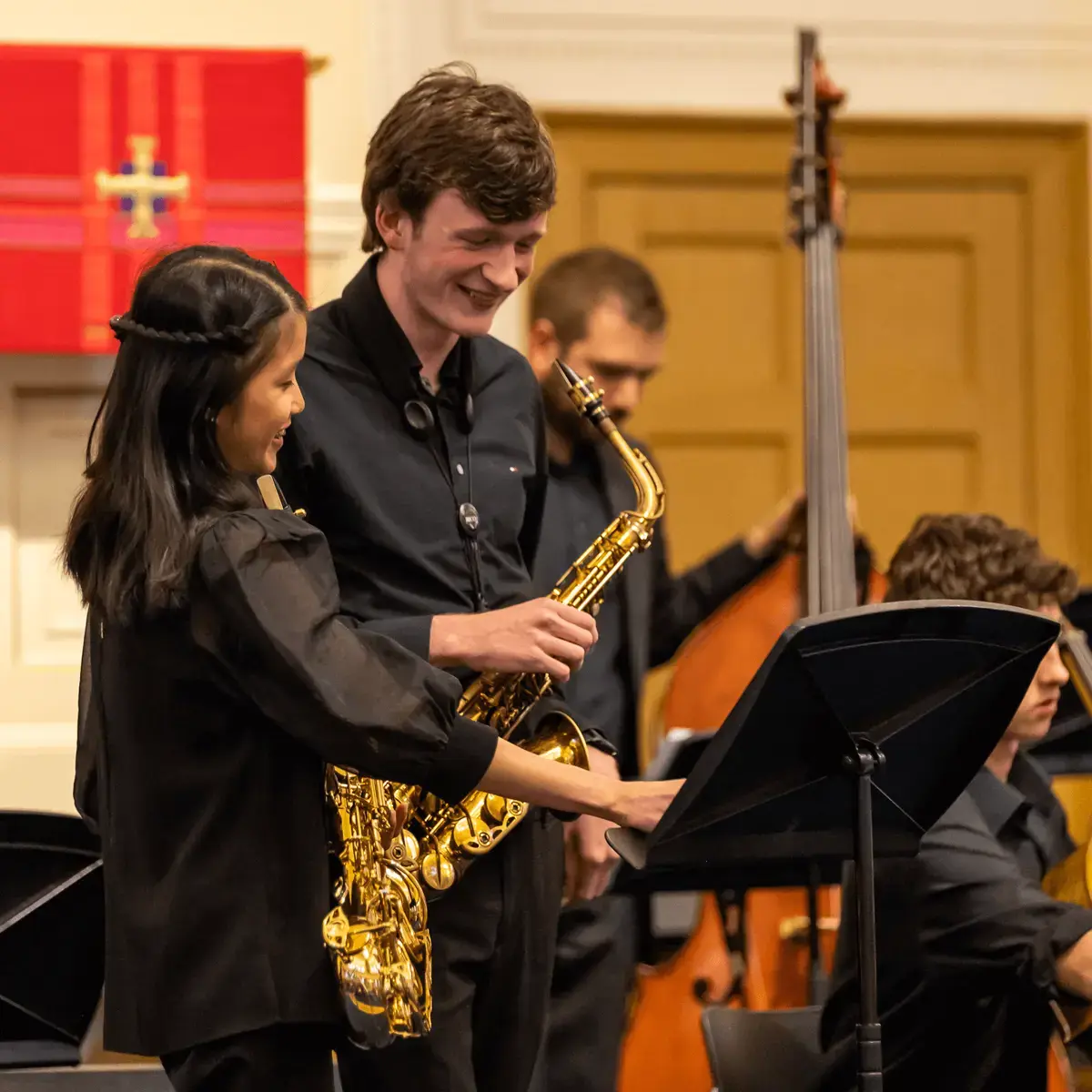
Jazz Ensemble

Improvisation Club
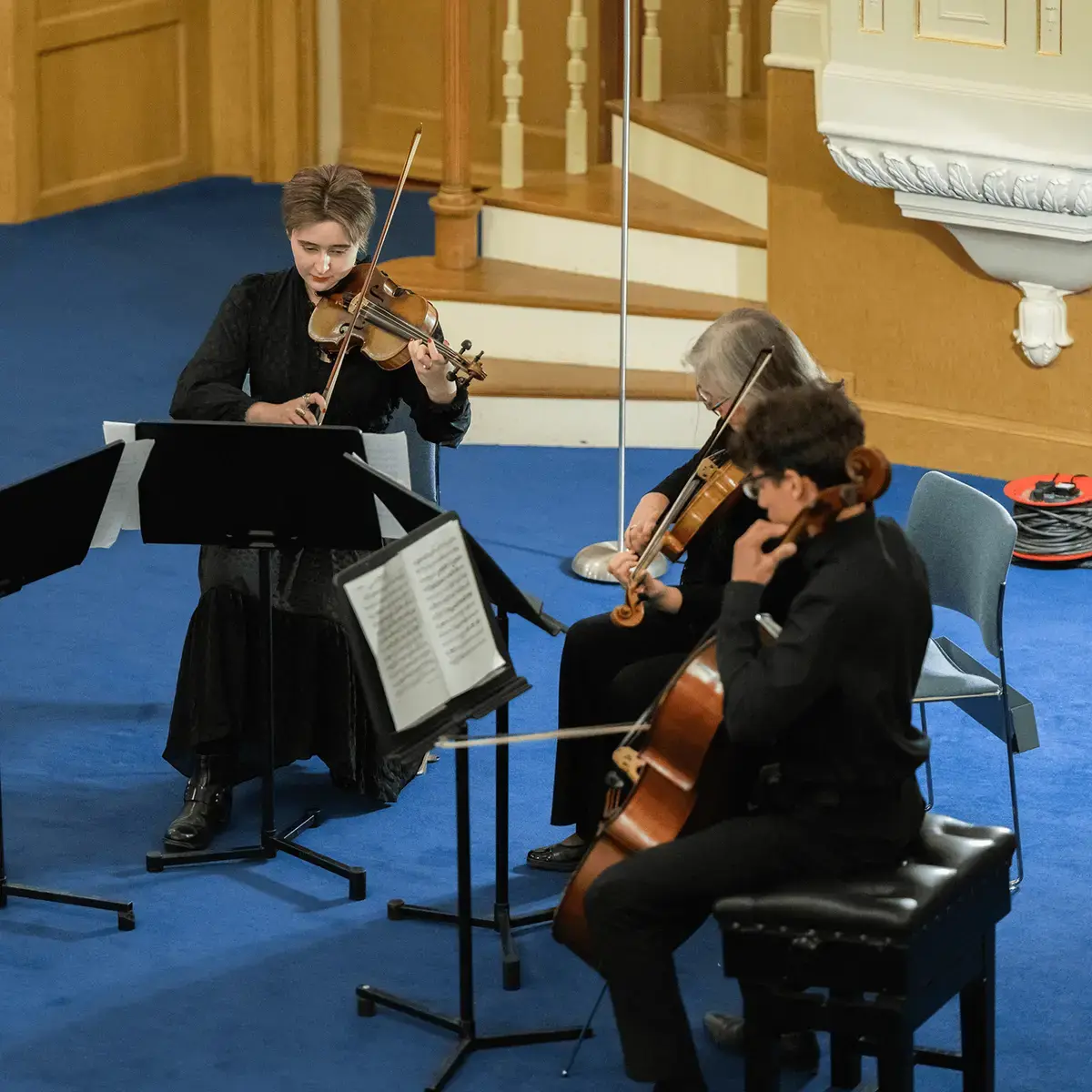
Senior Chamber Music Ensemble

Junior Chamber Music Ensembles
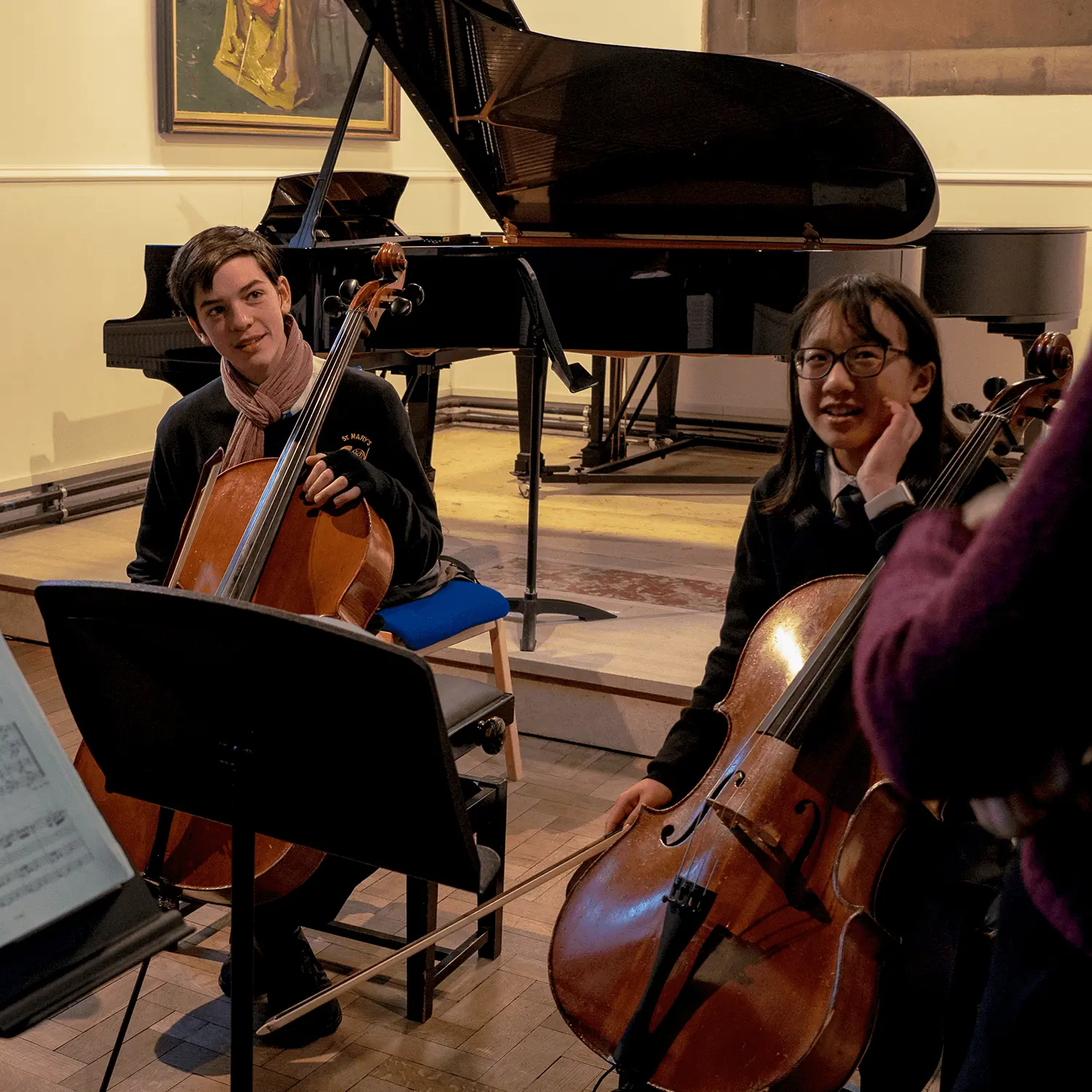
Musicianship Skills
School Choir
Every pupil, from the oldest to the youngest, sings in the School Choir, rehearsing every Friday morning for 45 minutes in preparation for performances throughout the year and we have a fabulous pupil-led Chamber Choir too, which meets outside school hours.
The School Choir is led by John Cameron and Kate Aitken and is an integral part of the programming for our three large end-of-term concerts. Choral singing is not only good for stress relief and improves breathing, posture and muscle tension, but provides a great opportunity for all of our pupils to learn, practice and sing together.
Performance Plus
Alongside Junior Chamber Music and Junior Orchestra, are youngest instrumentalists also take part in ‘Performance Plus’.
This is an opportunity for a dedicated ensemble to explore multiple genres and styles, music creation, improvisation and a wide range of ensemble skills. Led by a team of experienced performers and teachers, pupils are encouraged to experiment with their music making outwith traditional structures.
Links are made with active composers and improvisers to provide a real-world dimension, and pupil composers are actively encouraged to write for Performance Plus. Past projects, performances and recordings have included CoMa Festival of Contemporary Music (digital broadcast from Stockbridge Church), St Mary's Music School Jazz Concert (at St Andrew's & St George's West Church), our Easter Concert (at St Mary's Episcopal Cathedral) and Music for About 14 Musicians inspired by Steve Reich (a lockdown video with visual art).
Early Music Group
Our Early Music Group is open to pupils in S2 and above and provides a friendly and relaxed way to delve into the quirky and sometimes surprising world of Early Music and Historical Performance Practice.
Early Music is often more rhythmically and harmonically interesting and upbeat than many think and the Group challenges the stereotypes of the outwardly formal and be-wigged musicians and composers of the period, who don’t necessarily look like they were enjoying themselves!
We play wonderful music by Purcell, Vivaldi, Corelli and Muffat as well as works by lesser-known composers in styles that would be more familiar to 17th and 18th century ears, broadening musical horizons all the while. String players also enjoy the opportunity to play with Baroque bows.
Junior Orchestra
Our Junior Orchestra gives our pupils the opportunity to experience the joy of playing together in large numbers and is conducted by Dr Valerie Pearson, Head of Strings.
The Junior Orchestra rehearses for an hour every week and gives public performances at least three times a year which have recently included Corelli’s Christmas Concerto, as part of our own Christmas Concert, Warlock’s Capriol Suite at Rosslyn Chapel, as part of their Coronation celebrations, and Farkas’ Piccola Musica di Concerto, at the Parish Church of St Cuthbert’s, Edinburgh.
We aim to have as many Junior Instrumentalists as possible from P5 to S2 take part to learn and develop their skills in large ensemble playing, orchestral rehearsal practice, leadership and following a conductor. To support this aim, our Junior Orchestra programme includes lessons in musical arrangement and composing individual parts, so that non-orchestral instrumentalists (such as guitarists and saxophonists) and pianists, can create suitable parts to play, also on their second-study instrument where appropriate.
Senior Orchestra
Open to pupils from S3 and above, our Senior Orchestra meets each week at Palmerston Place Church, a short walk from Coates Hall, and is designed to give pupils experience of large ensemble rehearsal and performance under the direction of a conductor.
Our small pupil role means that a degree of inventiveness in programming is required for our three large-scale public concerts each year and our team of composers and arrangers is skilled in adapting repertoire to fit the available instruments. Guest directors and conductors are often brought in to add a new perspective and self-directed performances are also encouraged. New music is frequently performed as well as core repertoire in new guises and we provide orchestral tutti for our concerto soloists and work with the Cathedral Choir wherever possible. We have recently opened up access to our Senior Orchestra with young players from around the region invited to take part in rehearsal and concerts. These burgeoning collaborations allow us to offer a full symphonic orchestral experience for our own pupils and other young musicians.
Senior String Ensemble
The Senior String Ensemble at St Mary’s Music School is open to our most advanced senior string players (usually S4 to S6 extension year) and is directed by Dr Valerie Pearson, Head of Strings.
Pupils develop exceptional skills in group playing, which requires focused listening and highly responsive technique, supporting them to take on leadership roles in Chamber Music ensembles as well as creating opportunities for the group to be directed by a pupil soloist.
The Senior String Ensemble performs regularly in public, both as part of the School’s own end of term concerts and through outside engagements, and their recent repertoire has included Tchaikovsky’s Serenade for Strings, Dvorak’s Serenade for Strings, Bacewicz’s Concerto for String Orchestra, Britten’s Simple Symphony and Hindemith’s Trauermusik. In addition, pupils in this Ensemble also benefit from many opportunities to work with visiting professional artists with recent projects including performances of Tchaikovsky’s Souvenir de Florence with the Brodsky Quartet at the Brunton Theatre in Musselburgh, and of CPE Bach’s Cello Concerto in A, with cellist and school alumni Philip Higham, at the Parish Church of St Cuthbert’s in Edinburgh.
Brass Ensembles
Since 1994, our Brass Ensembles – directed by Professor John Kenny – have played a vital role in the lives of our pupils and depending on the school roll at the time, can include both junior and senor instrumentalists, with several advanced combinations being run simultaneously.
The repertoire extends from the 16th to the 21st centuries and ensemble line-ups have included a trombone quartet, brass trios, a horn quartet, a brass quintet, and full-scale brass dectet! The Brass Ensemble has given performances and recorded nationally and internationally, including the extraordinary opportunity to have a set of compositions for brass quintet by our own pupils commissioned and paid for by the Eu-rope-together Festival in Essen. Pupils went over to Germany to premiere their pieces for Deutsch Funk Radio and it is a source of great satisfaction that all of those players are now highly active professional composers. A CD album, Storm Chaser, was released in 2016, featuring compositions and arrangements by members and former members of the Ensemble.
Woodwind Ensemble
Jazz Ensemble
Mandatory for junior instrumentalists but optional for seniors, the Jazz Ensemble explores a mix of repertoire spanning continents and jazz styles across the whole jazz spectrum.
Pupils are taught in combined years groups and, in addition to the Jazz Ensemble, selected pupils are invited to join the Jazz Combo which explores more challenging repertoire and offers the opportunity to perform outside the School.
Improvisation Club
Our Improvisation Club encourages and supports pupils to explore improvisation through a variety of musical styles from Baroque to contemporary.
Pupils use existing harmonic frameworks to experiment with melodic ideas, try out different rhythmic patterns and grooves, and have the opportunity to play solo as well as improvising in different instrument combinations, using non-musical stimuli such as art and nature. The Club is a great place for pupils to come together to discuss and explore the many and varied aspects of improvisation.
Senior Chamber Music Ensemble
Chamber Music is a fantastic platform upon which to improved communication and listening skills as a musician. It relies on good listening, an understanding of an individual part and how that part fits into a bigger musical picture, and provides an opportunity to think through ideas and discuss them with fellow players.
The combination of teamwork, cooperation and artistry that Chamber Music encourages are great skills for any young musician hoping to become a professional. At St Mary’s Music School we have an extremely active Chamber Music programme led by Duncan Ferguson, fully integrated into pupils’ individualised timetables through twice-weekly rehearsals and coaching for all Senior Instrumentalists.
Junior Chamber Music Ensembles
Every junior instrumentalist takes part in Junior Chamber Music on their first-study instrument for one hour per week. Chamber Music requires the highest level of musical sensitivity and develops pupils’ musicianship, musical awareness, stylistic understanding and leadership skills, as well as reinforcing their musical reliability.
Dr Valerie Pearson, Head of Strings leads the Chamber Music programme for our junior instrumentalists and is supported by a specialist team of staff who assist in organising the pupils into suitable groups and in providing specialist coaching each week. The individual groups perform in our Lunchtime Concerts three times a year and recent performances have included movements from Mozart’s Piano Quartet no. 1 in G minor K478, Schubert’s Piano Trio no. 2 in Eb Major and Bartok’s Trios for Three Violins.
Musicianship Skills
One of the key benefits of the St Mary’s Music School experience is the immersive musical environment we nurture here. In addition to finetuning their instrumental and singing skills, our pupils receive a comprehensive education in all aspects of musicianship, which stands them in good stead for futures at college, conservatoire or university.
Indeed, many of our alumni have commented on how much easier they found the transition into a higher music education (much better prepared they were than many of their undergraduate peers!) thanks to the thorough grounding they received during their time with us
Our pupils learn to embrace the language of musicianship through lessons in harmony and counterpoint, form and analysis and music history, and all pupils have the option to study Alexander Technique to help with posture and movement. Throughout their time with us, pupils undertake a comprehensive Aural Programme that addresses singing, listening, Dalcroze and Kodaly.
Composition is a key skill for any budding young musician and our pupils both learn composition as a requirement for Advanced Higher Music (which everyone sits in S5) and have the opportunity to study composition more deeply as their first- or second-study, engaging in rehearsals, conducting their own work, and showcasing their talent through online recordings and presentations. The prestigious Isobel Dunlop Composition Award, supported by distinguished figures such as Stuart MacRae and Sir Alexander McCall Smith, provides a platform for recognition.
Improvisation classes give pupils the opportunity to practise improvising in a broad range of styles, and we provide a wide range of stimuli to encourage them to try out different ideas, and to explore their own stimuli too. Call and response is also used as a way to begin musical conversations that could be about the weather, a joke, an argument… the list is endless! Improvisations can also be based around short musical ideas or rules, such as only using the interval of a 4th, only using statements going up in pitch, or augmenting a specific motif. Pupils improvise together, as individuals, in pairs or in any given grouping to explore the possibilities unique to themselves and their instrument. They are also required to think critically about what does and doesn’t ‘work’ as well as develop their own subjectivity towards this very creative and important musical skill.
